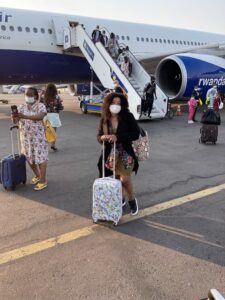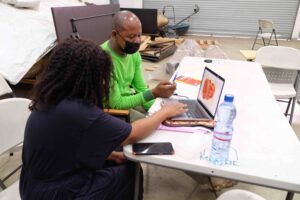‘When Musical Traditions Meet and Inspire’ is a new project I have just launched, thanks to Arts Council England and The National Lottery
Back in 2019, in my very first blog post, I explained that, throughout my singing and song-writing career, I have been greatly influenced by the musical traditions in the central region of African where I grew up. Since then I have become passionate about learning more about African music AND THE TRADITIONS PRACTICED AROUND the various genres.
Recently I realised that although my entire practice is based on African musical traditions, there are so many fascinating things about the inspiration of my music I still need to learn and share with others. Learning more about African musical traditions will revolutionise my singing and song-writing and other singers/song-writers’ too. In fact, for me ‘music is more than just these beautiful melodies and harmonious arrangements. Music is also the different traditions that are practised around it and form it.
I am writing this paragraph in the capital city of the DR Congo, Kinshasa in Africa, at l’ Institut National des Muses Du Congo (IMNC). It is 11 am on Friday 30th July, I arrived last Sunday and the following day, I started discovering a wealth of knowledge about the musical traditions of some Congolese tribes through interviews, their specialist library and an archive of field recordings.
In fact, every Monday while I am here, I will be spending the morning in the library reading books and other publications on African music. I will spend the afternoon reviewing work I accomplished during the week and planning my next steps with the musicologist and chief of the musicology department at IMNC, Papy Kele Longange, aka Gabriel. Mr Kela has been working in the musicology field with traditional practitioners since 2007. He has done field work with several tribes in the remote areas of the DR Congo, including traditional musicians, and he is an expert in traditional Congolese music.
On Tuesdays and Thursdays, I will spend time listening to field recordings and on Wednesdays and Fridays I will conduct interviews with traditional music practitioners. Some interviews will take place here at the Institute and others out and about in the city of Kinshasa. I plan to conduct more interviews directly in neighbourhoods where my interviewees live and practice Congolese music.
By the way, I have been received with opened arms and every person I have come across here at IMNC is pleasant and helpful. Big thanks to you all at IMNC!
To keep up with the progress of my project, subscribe to my blog and you will receive a notification whenever I publish a new post.




I am really impressed by what you are doing, carry on this path, you will not only inspire other people but spread the word of congolese music to others.
I have had the pleasure of reading some of the translated transcripts from Emmanuela’s research interviews. Such as wealth of knowledge about lesser known tribal communities in the DRC and the ancient musical traditions which form a huge part of their cultural identity, its fascinating!
In the future this material will be archived at the Ahmed Iqbal Ullah RACE Central and made available to the public.
I’m so pleased to read about the development of your research and practice, after spending a long time together applying for funds and anticipating the outcome. It bring me so much joy to listen to your music. Congratulations on all you’ve achieved so far x